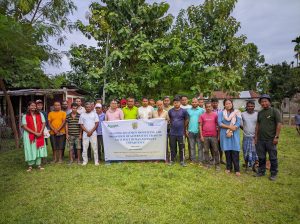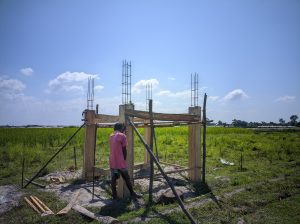Guwahati, October 19: A multi-pronged strategy has been adopted by the premier biodiversity conservation organisation Aaranyak (www.aaranyak.org) to steam up its community-oriented efforts for mitigation of human-elephant conflict (HEC) so as to facilitate coexistence in a few affected areas on Tamulpur and Baksa districts of Assam.
The three-pronged strategy involves introducing HEC-affected farmers to cultivation of different crops as alternatives to paddy; installation of solar-powered LED lights to keep off wild elephants from human settlements and crop fields and construction of watch towers to facilitate community vigil over crop fields against herds of wild elephants. The initiatives have been supported by the United States Fish and Wildlife Service (USFWS) and SBI Foundation (SBIF).
Alternative crops
Introducing the HEC-affected communities to alternative crops that are found less palatable by wild elephants and useful as bio-fencing that deters elephant herds, has been tried at Sesapani village of Tamulpur district. These alternative crops also supplement the income of the HEC affected people besides mitigating the conflict.

Aaranyak organised a training programme for the community at Sesapani village on cultivation of alternative crops to build the community’s capacity on October 6. The training programme was participated in by 40 local farmers.
Ms. Bhanita Baruah, the Agriculture Development Officer (ADO) of Kumarikata Circle of Tamulpur district, who was the resource person, provided valuable insights to the farmers on the cultivation of crops that are less likely to be foraged by elephants, with a particular focus on crops like Assam lemon, ginger, turmeric, and mustard that also command good prices in the market.
The official also sensitised the participating farmers the importance of crop quality and variety, seed treatment, land preparation, nutrient management, sowing methods, disease control, and the economic advantages associated with these crops.
As part of this initiative, 50 kilograms of mustard seeds were distributed to 18 farmers who expressed keen interest in cultivating it.
Later, on October 13, another 50 kg of mustard seeds were provided to 17 interested farmers from six villages in Udalguri district under the Bhooteachang VCDC to promote cultivation of alternative crops.
LED Lights
Five solar powered LED lights were installed at five different locations with an average distance of 250 meter apart between two lights in Nayapara and Hastinapur areas under Chawlkara Revenue village of Baksa district on October 14 last to protect the crop fields from foraging by wild elephants and prevent elephants from moving in and around human settlements.
Prior to the installation, a survey had been undertaken by the Aaranyak team with support from the villagers to understand the elephant movements in the area so as to identify strategic locations for installation of the LED lights.
These LED lights, powered by solar energy and sensors, illuminate a particular area in a rhythmic sequence in the dark. The elephants are known to avoid these lights, and thus their movements around human settlements are restricted. Through this initiative which has been supported by SBI Foundation, around 1500 households in the Chawlkara revenue village will be benefitted.
Watch Towers

In Onthaibari and Khasibari neighbourhoods of No. 2 Dongorgaon village in Baksa district, Aaranyak in collaboration with the local communities, has initiated construction of six permanent watchtowers to facilitate community-crop guarding to protect the standing paddy from foraging by wild elephants. Community crop guarding has been found to be effective and has been tried and tested in other areas of the landscape.
The Aaranyak team comprising Anjan Baruah, Rabiya Daimary, Abhijit Saikia, Mondeep Basumatary, Reshma Narzary, Didwm Daimary, Bikas Tossa, Jibon Chhetri, and Pradip Barman participated in undertaking all these initiatives meant for facilitating human-elephant coexistence.



